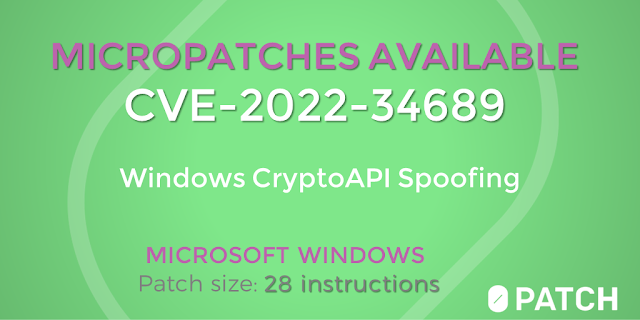August 2022 Windows Updates* brought a fix for CVE-2022-34689, a vulnerability in Windows CryptoAPI that allows an attacker to trick some Windows applications - depending on their use of CryptoAPI certificate caching - into accepting a fraudulent certificate. The vulnerability was reported to Microsoft by UK NCSC and the NSA, but subsequently Tomer Peled and Yoni Rozenshein of Akamai reverse engineered Microsoft's patch and provided a detailed analysis with a proof-of-concept.
(* While Microsoft published this information in October, they had silently provided the patch two months earlier.)
The vulnerability is actually a cryptographic flaw, whereby broken MD5 hashing algorithm is used for identifying cached certificates. This allows the attacker to trick a Windows application into misidentifying a fraudulent certificate for a valid, cached one, because they both have the same MD5 hash.
It is hard to say which applications are vulnerable; any Windows application using CryptoAPI with certificate caching is a potential candidate, but exploitability may depend on how the application is being used. For instance, Akamai researchers have identified old Chrome versions to be vulnerable, allowing a malicious web site with a fake certificate to impersonate a valid web site.
While
still-supported Windows systems have already received the official
vendor fix for this vulnerability, there are Windows systems out there
that aren't receiving security fixes from Microsoft anymore. In order to
protect these systems, we have created our own micropatches for this
vulnerability, which are available through the 0patch service.
Our patches are logically equivalent to Microsoft's patches for this issue.
MODULE_PATH ".\crypt32.dll"
PATCH_ID 1000006
PATCH_FORMAT_VER 2
VULN_ID 1000007
PLATFORM win64
patchlet_start
PATCHLET_ID 1
PATCHLET_TYPE 2
PATCHLET_OFFSET 0x159f9
N_ORIGINALBYTES 5
JUMPOVERBYTES 0
PIT msvcrt!memcmp,crypt32!0x18c14,crypt32!0x15a01,crypt32!0x15a26
; 0x18c14 -> CCertObject::Release
; 0x15a01 -> FindEndObjectByHash block
; 0x15a26 -> Nevem še
code_start
mov rsi, rax ; rax contains the returned certificate structure
; when searching the cache
test rax, rax ; check if a certificate was found in the cache
jz LABEL ; jump to LABEL if no certificate was found
mov rcx, [rax+58h] ; get cached cerfiticate context
mov rdx, [rsp+50h] ; struct _CERT_CONTEXT *, current certificate
mov eax, [rcx+10h] ; get cached certificate length
cmp eax, [rdx+10h] ; compare length from cached and current certificate
jnz LABEL2 ; jump to LABEL2 if lengths are not equal
mov rdx, [rdx+8] ; first buffer, current certificate context
mov r8d, eax ; number of characters to compare
mov rcx, [rcx+8] ; second buffer, cached certificate context
call PIT_memcmp ; compares characters in two buffers
test eax, eax ; memcmp returns 0 if equal
jz LABEL ; jump to LABEL if both contextes were equal
LABEL2:
mov rcx, rsi ; contains the returned certificate structure
; when searching the cache
call PIT_0x18c14 ; call CCertObject::Release
; release decrements the number of references to the certificate
; if references are 0 then ~CCertObject and PkiFree are called.
xor rsi, rsi ; set rsi to 0
mov [rsp+58h], rsi ; set pointer to cached certificate to 0
LABEL:
test rsi, rsi ; is the context of the cached certificate equal?
jnz PIT_0x15a26 ; yes, they are equal, trust the certificate
jmp PIT_0x15a01 ; no, context not equal, don't trust the certificate
code_end
patchlet_end
Micropatch Availability
The micropatch was written for the following security-adopted versions of Windows with all available Windows Updates installed:
- Windows 10 v2004
- Windows 10 v1909
- Windows 10 v1809
- Windows 10 v1803
- Windows 7 (without ESU, with ESU year 1, and with ESU year 2)
- Windows Server 2008 R2 (without ESU, with ESU year 1, and with ESU year 2)
Vulnerabilities like this one get discovered on a regular basis, and
attackers know about them all. If you're using Windows that aren't
receiving official security updates anymore, 0patch will make sure these
vulnerabilities won't be exploited on your computers - and you won't
even have to know or care about these things.
If you're new to 0patch, create a free account in 0patch Central, then install and register 0patch Agent from 0patch.com, and email sales@0patch.com for a trial. Everything else will happen automatically. No computer reboot will be needed.
We'd like to thank Tomer Peled and Yoni Rozenshein of Akamai for sharing their POC, which allowed us to create a micropatch and protect our users against this attack. We also encourage all security researchers to privately share their analyses with us for micropatching.

No comments:
Post a Comment